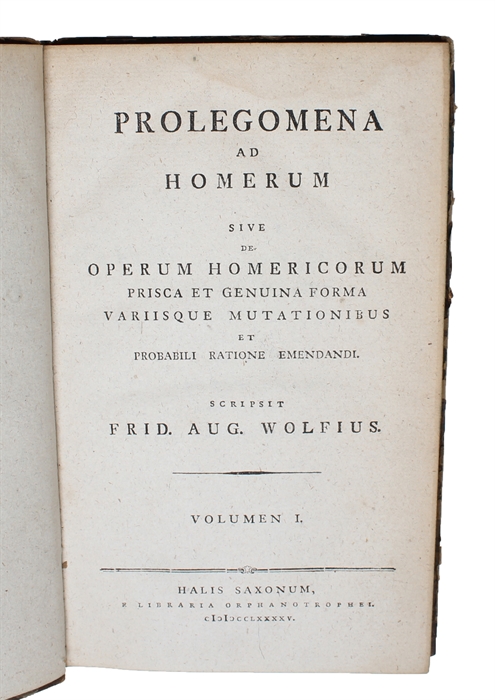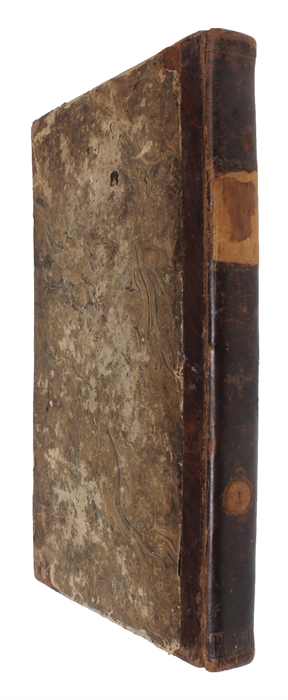THE NEW PHILOLOGY - PMM 248
WOLFIUS [WOLF], FRID. AUG.
Prolegomena ad Homerum sive de Operum Homericum prisca et genuina forma variisque mutationibus et probabili ratione emendandi. Volumen I (all that appeared).
Halis Saxonum (Halle), E Libreria Orphanotrophei, 1795.
8vo. Contemporary half calf with a bit of wear, especially to corners and edges. Gilding to title-label worn off. Paper over boards loosening at edges. Overall fine and tight. A light damp stain to upper margin and a few leaves with some light brownspotting.
Scarce first edition of the epoch-making work that founded modern philological scholarship and began the modern debate over the date of writing of Homer's works, creating in turn the two Homeric schools of thought, the Analysts and the Unitarians.
Although the work bears on the title-page the words "Volumen I", no second volume ever appeared, and Wolf never made any attempt to compose it.
"When Wolf took up his professorship in 1783, a critical point in the history of education had been reached. New ideas derived from Locke and Rousseau were at work and Wolf longed to enter the fray. He found able and enlightened allies in the ministers of Frederick the Great, and with their help and by his enthusiasm he was able to carry out his long-cherished plan to give a new basis to the science of philology. To Wolf this meant philology in the original sense - love of letters, of learning and of language. He defined it as "the knowledge of human nature as exhibited in antiquity"; its matter was everything that remained of ancient culture, to which an equal care and scholarship must be devoted. The "Prolegomena to Homer", the best exposition of Wolf's beliefs, were written in a great hurry to meet the needs of a lecture course, and they have all the merits of good lectures: command of method, the gift of inspiration, penetration and breadth of view. Wolf's thesis is no theory, but a collection of great ideas, which laid the foundations for the dominance of German scholarship in the nineteenth century. They have inspired and given purpose to education ever since." (Printing and the Mind of Man).
With the 18th century came major developments in classical scholarship, the greatest of the classic epics being no exception - Homeric scholarship changed dramatically, and the end of the century saw the opening of the discussion which was to dominate the 19th and 20th centuries, namely that of the "Homeric question". The Homeric question is essentially the question of the identity of the poet(s) of the Homeric epics, and the nature of the relationship between "Homer" and the epics. In the 19th century it came to be the fulcrum between two opposed schools of thought, the Analysts and the Unitarians. The issue came about in the context of 18th-century Romantic interest in popular lays and folktale, and the growing recognition that the Homeric epics must have been transmitted orally before being written down, possibly much later than "Homer" himself. The key to determining who Homer was, lay in the answer to the question of when the poems were composed.
The modern debate over exactly when they took on a fixed written form, began with the present work by Wolf. According to Wolf, the date of writing is among the first questions in the textual criticism of Homer. He considers the real mode of transmission of the poems and acknowledges that it was oral, arguing that they were composed in the mid-10th century BC. He further concludes that the Iliad and the Odyssey could not have been composed in the form in which we know them without the aid of writing and that they changed considerably over time in the hands of bards performing them orally and editors adapting written versions to contemporary tastes. The apparent artistic unity of the poems must have come about after their transcription.
This new form of philological scholarship completely altered the way that philology has been done ever since the appearance of the present work.
Order-nr.: 50015


